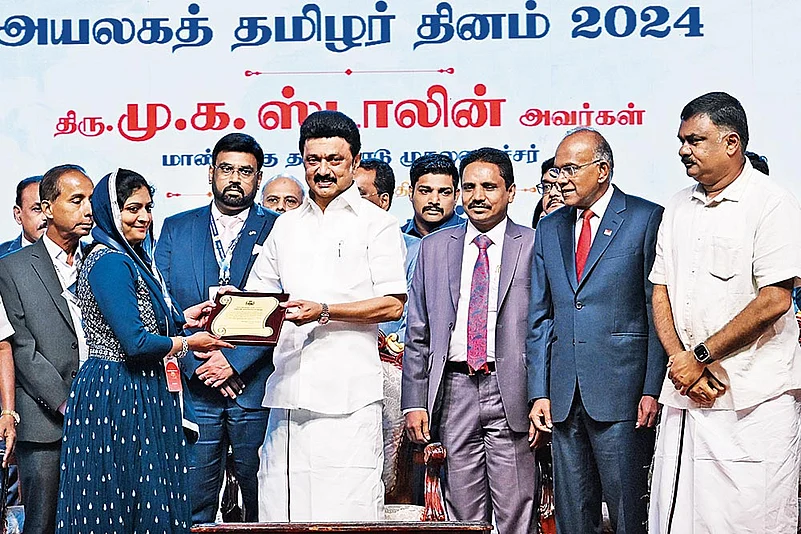In 2010, the visionary leader and former Chief Minister of Tamil Nadu, Kalaignar Karunanidhi, unveiled a groundbreaking initiative aimed at fostering closer ties with the Tamil diaspora and addressing the welfare needs of non-resident Tamils. This initiative laid the foundation for the establishment of the Non-Resident Tamils Welfare Board, a pioneering institution dedicated to serving the interests of Tamils living beyond the borders of Tamil Nadu. Building upon this visionary framework, M.K. Stalin, upon assuming the mantle of Chief Minister in 2021, demonstrated his commitment to this cause by formalizing the board and appointing a dedicated team to spearhead its activities. This essay delves into the objectives, activities, and impact of the Non-Resident Tamils Welfare Board, with a particular emphasis on its engagement efforts and the commemoration of Non-Resident Tamils Day.
Fostering Global Tamil Unity
Historically, Tamils have ventured abroad for trade, expeditions and also to settle abroad. A large number of Tamils migrate to foreign countries for economic reasons, globalization and in search of employment. The State has created a Commissionerate to ensure the welfare of all Non-Resident Tamils.

The inception of the Non-Resident Tamils Welfare Board in 2010 marked a watershed moment in the history of Tamil Nadu’s engagement with its global diaspora. Under the leadership of Kalaignar Karunanidhi, the state recognized the importance of fostering stronger ties with non-resident Tamils and providing them with a platform to connect with their roots. Karunanidhi’s vision underscored the significance of harnessing the collective strength and resources of the Tamil diaspora to contribute to the socio-economic development of Tamil Nadu and to preserve the rich cultural heritage of the Tamil people.
Upon assuming office in 2021, Chief Minister M.K. Stalin reaffirmed the government’s commitment to the welfare of non-resident Tamils by institutionalizing the Non-Resident Tamils Welfare Board. The board, comprising members from across the globe, was tasked with formulating policies and programs to address the diverse needs and aspirations of the Tamil diaspora. At its core, the establishment of the board reflected the government’s recognition of the invaluable contributions of non-resident Tamils to the socio-cultural fabric of Tamil Nadu and its commitment to fostering stronger bonds of solidarity and collaboration with the global Tamil community.
To foster greater unity, Tamils living across the world have come together to contribute to the socio-economic development of Tamil Nadu
Since its establishment, the Non-Resident Tamils Welfare Board has been actively engaged in a wide range of activities aimed at promoting the welfare and well-being of non-resident Tamils. These activities encompass various spheres, including cultural exchange, educational initiatives, economic empowerment, and social welfare programs.
One of the key focus areas of the board has been fostering greater engagement and collaboration between non-resident Tamils and their counterparts in Tamil Nadu. To this end, the board has organized numerous cultural festivals, seminars, and exchange programs that provide opportunities for non-resident Tamils to reconnect with their roots, exchange ideas, and forge meaningful partnerships with local communities. These initiatives not only serve to strengthen the bonds of cultural identity and solidarity but also facilitate knowledge exchange and mutual learning between different segments of the Tamil diaspora.
In addition to promoting cultural exchange and collaboration, the Non-Resident Tamils Welfare Board has also undertaken various initiatives to support the educational aspirations of non-resident Tamil youth. Through scholarships, mentorship programs, and educational workshops, the board seeks to empower young Tamils to pursue their academic and professional goals and become active contributors to their communities and societies.
Furthermore, the board has initiated several economic empowerment programs aimed at creating opportunities for non-resident Tamils to invest in Tamil Nadu’s burgeoning economy and contribute to its growth and development. By facilitating investment forums, business networking events, and skill development initiatives, the board aims to harness the entrepreneurial spirit and expertise of the Tamil diaspora to drive innovation, job creation, and economic prosperity in the state.
Non-Resident Tamils Day
One of the most significant initiatives undertaken by the Non-Resident Tamils Welfare Board is the commemoration of Non-Resident Tamils Day, an annual event dedicated to celebrating the contributions and achievements of non-resident Tamils to the global community. Held on the last Sunday of January each year, Non-Resident Tamils Day serves as a poignant reminder of the enduring bond that unites Tamils across geographical boundaries and underscores the collective strength and resilience of the Tamil diaspora.
The commemoration of Non-Resident Tamils Day encompasses a wide range of activities and events, including cultural performances, exhibitions, panel discussions, and award ceremonies, which showcase the rich cultural heritage, artistic talents, and entrepreneurial spirit of the Tamil diaspora. Through these celebratory events, the board seeks to honor the contributions of non-resident Tamils to various fields, including literature, music, dance, science, technology, business, and philanthropy, and to inspire future generations to carry forward the legacy of excellence and service.
The establishment of the Non-Resident Tamils Welfare Board represents a significant milestone in Tamil Nadu’s engagement with its global diaspora and underscores the government’s commitment to promoting the welfare and well-being of non-resident Tamils. Through its diverse range of activities and initiatives, the board has sought to foster greater unity, collaboration, and solidarity among Tamils living across the world and to harness their collective potential to contribute to the socio-economic development of Tamil Nadu and the broader global community. As we commemorate Non-Resident Tamils Day, let us reaffirm our commitment to celebrating the rich diversity and heritage of the Tamil people and to building a brighter future for generations to come.
Registration Of Diaspora Includes
Initiating identity cards for working and studying, insurance cover, 24/7 helpline
Education of children of those who died abroad
Marriage assistance
Pre-departure orientation centers
Vergalai thedi
Legal cell
Recognition of Tamil Sangam society worldwide
Specific legal issues, marital, technical, diplomatic visa related, child custody among others
Additional Information
A separate NRI cell, headed by a superintendent of police, is functioning under the direct supervision of ADGP (L&O). The NRI cell is functioning from police headquarters Mylapore, Chennai.



















